Related Research Articles
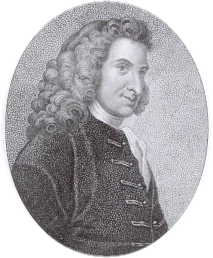
Henry Fielding was an English novelist, irony writer and dramatist known for earthy humour and satire. His comic novel Tom Jones is still widely appreciated. He and Samuel Richardson are seen as founders of the traditional English novel. He also holds a place in the history of law enforcement, having used his authority as a magistrate to found the Bow Street Runners, London's first intermittently funded, full-time police force.

Hanworth is a district of West London, England. Historically in Middlesex, it has been part of the London Borough of Hounslow since 1965. Hanworth adjoins Feltham to the northwest, Twickenham to the northeast and Hampton to the southeast, with Sunbury-on-Thames to the southwest.

Thomas Tanner was an English antiquary and prelate. He was Bishop of St Asaph from 1732 to 1735.
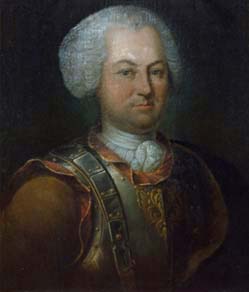
Major-General Granville Elliott, 1st Count Elliott, was a British military officer who served with distinction in several other European armies and subsequently in the British Army. He fought at the Battle of Minden where he was wounded, dying of his injuries several weeks later.

Charles FitzRoy, 2nd Duke of Grafton, was an Irish and English politician.

George Lyttelton, 1st Baron Lyttelton,, known between 1751 and 1756 as Sir George Lyttelton, 5th Baronet, was a British statesman. As an author himself, he was also the supporter of other writers and as a patron of the arts made an important contribution to the development of 18th century landscape design.
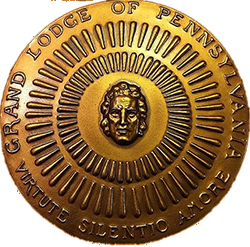
The Grand Lodge of Pennsylvania, officially The Right Worshipful Grand Lodge of the Most Ancient and Honorable Fraternity of Free and Accepted Masons of Pennsylvania and Masonic Jurisdictions Thereunto Belonging, is the premier masonic organization in the Commonwealth of Pennsylvania. The Grand Lodge claims to be the oldest in the United States, and the third oldest in the world after England and Ireland, having been originally established as the Provincial Grand Lodge of Pennsylvania in 1731. This claim is disputed by both the Grand Lodge of Massachusetts and the Grand Lodge of Virginia.

Bartolomeo Giuseppe "del Gesù" Guarneri was an Italian luthier from the Guarneri family of Cremona. He rivals Antonio Stradivari (1644–1737) with regard to the respect and reverence accorded his instruments, and for many prominent players and collectors his instruments are the most coveted of all. Instruments made by Guarneri are often referred to as Del Gesùs.

Hanworth is a village and a civil parish in the English county of Norfolk. It is 18.8 miles (30.3 km) north of Norwich, 5.4 miles (8.7 km) south-west of Cromer and 133 miles (214 km) north-east of London. The nearest railway station is Gunton on a branch line, the Bittern Line, commencing at Norwich. Norwich International Airport is closer to the city. The parish had in 2001 and 2011 a population of 169 people. The primary local government authorities are North Norfolk and for education, social care and much infrastructure Norfolk County Council.

Charles Moss was an Anglican clergyman who served as Bishop of St David's from 1766 to 1774 and Bishop of Bath and Wells from 1774 to 1802.

The organisation known as the Premier Grand Lodge of England was founded on 24 June 1717 as the Grand Lodge of London and Westminster. Originally concerned with the practice of Freemasonry in London and Westminster, it soon became known as the Grand Lodge of England. Because it was the first Masonic Grand Lodge to be created, convention calls it the Premier Grand Lodge of England in order to distinguish it from the Most Ancient and Honourable Society of Free and Accepted Masons according to the Old Constitutions, more usually referred to as the Ancient Grand Lodge of England, and the Grand Lodge of All England Meeting at York. It existed until 1813, when it united with the Ancient Grand Lodge of England to create the United Grand Lodge of England.

Edmund Keene was an English churchman and academic, who was Master of Peterhouse, Cambridge and later served first as Bishop of Chester, then Bishop of Ely.
Henry Stebbing (1687–1763) was an English churchman and controversialist, who became archdeacon of Wilts.

Sir William Humfreys, 1st Baronet, was a British ironmonger and politician who sat in the House of Commons from 1715 to 1722. He was Lord Mayor of London for 1714–15 and a Director of the Bank of England between 1719 and 1730.
John Newey was an English churchman, Dean of Chichester from 1727 to 1735.
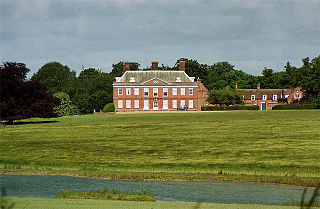
Hanworth Hall is a large late 17th century country house some 500m to the south of the village of Hanworth, Norfolk, England. It is protected and recognised in the highest category of the three in the English statutory scheme, as a Grade I listed building.
Thomas Bott (1688–1754) was an English cleric of the Church of England, known as a controversialist.
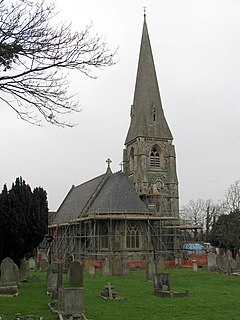
St George's Church, Hanworth, is a Church of England parish church based in Hanworth, London. It is dedicated to Saint George and has Grade II* listed status.
James King, 4th Baron Kingston was a British member of the peerage. King was a prominent freemason, being the Grand Master of the Premier Grand Lodge of England for 1728–1730 and also Grand Master of the Grand Lodge of Ireland for 1731–1732 and 1735–1736. He was also a member of the Privy Council of Ireland. Despite being born in France to Jacobite parents, he was naturalised at the age of 13 years old on 8 January 1707 as a British subject and was a Protestant.
References
![]() This article incorporates text from a publication now in the public domain : "England, George (fl.1735)". Dictionary of National Biography . London: Smith, Elder & Co. 1885–1900.
This article incorporates text from a publication now in the public domain : "England, George (fl.1735)". Dictionary of National Biography . London: Smith, Elder & Co. 1885–1900.